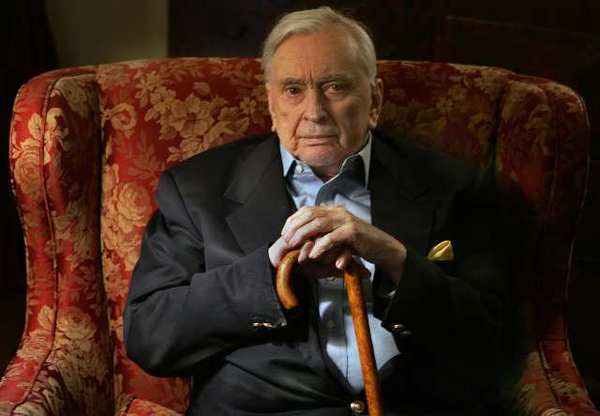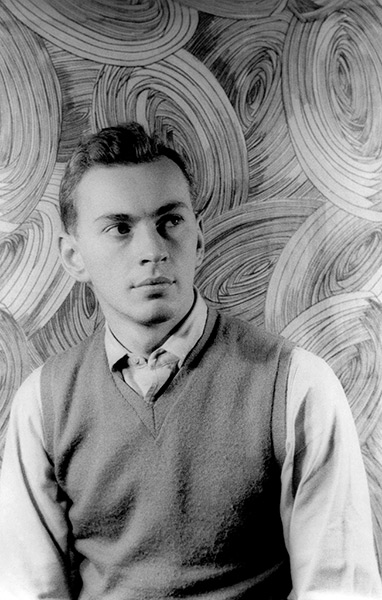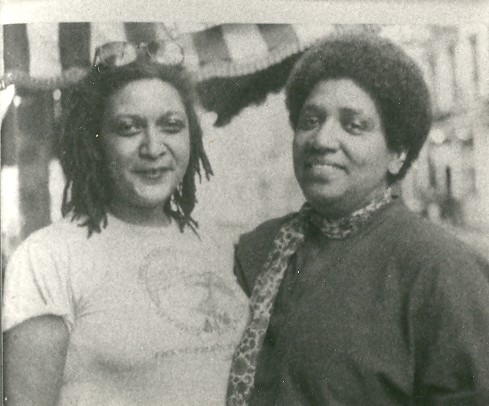+

Gore Vidal was born into the lap of West Point luxury in 1925. His mother was a ruthless socialite; his father, an absent pilot. Vidal’s young adulthood was full of little foreshadowing flecks of rebellion. Unlike many members of his privileged social class, Vidal opted to join the Army instead of attending an Ivy League university. Born as “Eugene Louis,” the name “Gore” would be added during his christening. He would later scrap the former and keep the latter.
His experiences in the armed forces would trickle into many of his 25 novels, two memoirs, and eight plays–including a nod to his relationship with James Trimble III, a soldier killed in the Battle of Iwo Jima in 1945.
In the last three decades of the 20th century, Vidal bacame one of the strongest and sassiest voices against America’s military-industrial complex, Ronald Reagan and both Bushes:
Everything the Bushites touch is screwed up. They could never have pulled off 9/11, even if they wanted to. Even if they longed to. They could step aside, though, or just go out to lunch while these terrible things were happening to the nation. I believe that of them.

Vidal’s contributions to queer visibility were huge and unprecedented. As a fresh-faced 23 year-old, he published The City and The Pillar in 1948. The novel, centering around a queer Marine’s sexual awakening and armed forces travels, created such a scandal that New York Times critic Orville Prescott refused to review Vidal’s next five novels.
At that time, even considering writing a book with queer content was unthinkable. It would be nearly a decade before lesbian pulp fiction became the filler of choice for drug store aisles. Three years later, Patricia Highsmith would publish The Price of Salt. Despite the rumor of a sequel, the work and subject matter would never be revisited. Even though the novel was initially published under the Claire Morgan pseudonym, the possibility of being outed would haunt Highsmith for decades.
I was born a writer. If you’re born that, you can’t change it. You’re going to do it whether you want to or not. – Gore Vidal
The writer described how he’d convinced Boyd and director William Wyler that there had to be a deeper motive to explain Messala’s lethal hatred of his old friend Ben-Hur — namely, that the two men once had a homosexual relationship that Messala wanted to resume but Ben-Hur did not.
According to Vidal, Heston was never let in on that twist, and the actor was not amused by Vidal’s account in the film. In a March 17, 1996, letter to The L.A. Times, Heston asserted that Vidal had a minimal role in writing Ben-Hur; Heston wrote that Vidal “produced a scene of several pages which Wyler rejected after a read-through.”
“Vidal’s claim that he slipped in a scene implying a homosexual relationship between the two men insults Willy Wyler and, I have to say, irritates the hell out of me,” Heston concluded.
Vidal, never one to back down from a verbal brawl, responded to Heston’s terse letter with a much longer elaboration of his role in Ben-Hur, and taunting Heston as “the spokesperson for the National Rifle Assn.”
As usual, Vidal had the last word.
“As for you, Chuck,” he summed up, “just remember that wise saying, Oh what a tangled web we weave when first we practice to deceive.”
As a dyke, I’ve always paid special attention to queer female writers. Adrienne Rich’s death earlier this year triggered a month of revisting her work.
While gay white men frequently slip under my biased literary radar, I could not shake the fact that Gore Vidal was some huge figurehead that I’d been missing out on for reasons other than my preference for the ‘L’ over the ‘G’ in ‘LGBTQ literature’. This was not an issue of elitism. Vidal’s death feels just as close to the bone as Adrienne Rich’s did earlier this year. This is a generational issue.
In youth and early adulthood, we’re exposed to mix of the mainstream books previous generations have lauded classics, and younger, promising writers of from our own generation.
Given the contraversy, Vidal was not particularly lauded until the later decades of his life; his work had slipped through those cracks in my high school and collegiate syllabi.
We are all bisexual to begin with. That is a fact of our condition. And we are all responsive to sexual stimuli from our own as well as from the opposite sex. Certain societies at certain times, usually in the interest of maintaining the baby supply, have discouraged homosexuality. Other societies, particularly militaristic ones, have exalted it. But regardless of tribal taboos, homosexuality is a constant fact of the human condition and it is not a sickness, not a sin, not a crime … despite the best efforts of our puritan tribe to make it all three. Homosexuality is as natural as heterosexuality. Notice I use the word ‘natural,’ not normal.
– Gore Vidal

On my last night in Los Angeles, I spoke with poet/author/playwright Jewelle Gomez on her thoughts following Vidal’s passing:
“So in my younger years, hearing him speak – because it was always on the talk shows, so I wasn’t really aware of who he was historically at that time. In ’60s and ’70s, he would always be on The Cavett Show and things like that. I just knew he was this eloquent literary person. It wasn’t until later, probably in the ’70s or ’80s, when I started doing much more reading, and read back: read about his work and read about being basically blackballed for writing his gay novel.
Gore Vidal on Face the Nation in 1984
I was recently doing my own play about James Baldwin and his anxiety about writing a gay novel. That was one of the things I went back to to think about what had happened, probably 15 to 20 years earlier with Gore Vidal. Gore Vidal’s experience reconfirmed for me that anxiety about putting something out in the world that was gay-focused in 1957 was not an easy task. James Baldwin knew, I’m sure, very explicitly what had happened to Gore Vidal, that Gore Vidal had to make another career for himself under other names.
It really was an important confirmation for me of how much he brought to the world as an artist refusing to skulk away, and how much he must have been a beacon for some other writers who were trying to figure out what to do.”
Despite never opening a Vidal novel until after his death, I’d still touched and had my heart stolen by many works that his openness had inspired, from The Price of Salt to Baldwin’s Sonny’s Blues.
Visibility is so easily taken for granted, particularly when the things we are looking at are words on a page, not actors on a screen or musicians on a stage. Yet without Vidal’s brassiness, one wonders if queer literature would exist in the scope it does today. As writers and readers, we should be infinitely grateful for Vidal being so unapologetic and indignant, many decades before it was sanctioned, let alone comfortable, to do so.








Comments
Burr, Lincoln and Julian are all very good novels of his that I’d recommend.
Bit of whitewashing going on here. his comments about the polanski rape case are so freakin appalling i honestly couldn’t care less whether he was a great writer or a queer activist.
Not gonna lie, that’s my opinion too. I admit I don’t know that much about him, but hearing what he said about the Polanski case makes me feel pretty justified in not giving a shit.
I agree. I think Melissa at Shakesville put it well:
“[Content Note: Rape apologia; transphobia.]
Gore Vidal was a great writer, in the sense that he knew how to craft a fucking sentence. And during his life, he made some very important and interesting observations, about important and interesting things.
But it isn’t the elegance of his craft or any of his keen observations that come to mind when I think of the name Gore Vidal.
It is Gore Vidal saying, about his friend Roman Polanski raping a 13-year-old girl: “I really don’t give a fuck. Look, am I going to sit and weep every time a young hooker feels as though she’s been taken advantage of?”
There are plenty of people who would say I’m being unfair, to overlook a lifetime of work for one comment. To which I can only say that I am offering Mr. Vidal the same contempt in return he had for raped teenage girls, like me.
And that’s all I really have to say about that.
Garland has more to say, on the subject of Vidal’s rape apologia and his deeply transphobic novel, Myra Breckinridge.”
( http://www.shakesville.com/2012/08/so-gore-vidal-died.html )
i find it so strange that you say you had never heard of him before… i havent read any of his work either but in greece where im from his name is very well-known, especially among the leftist cirles. i’d compare him to noam chomsky in terms of intellectual status. could it be his political ideas, next to his homosexuality, that kept away from public awareness maybe?
He’s just another transphobe to me. Glad the world has one less.
tigerbeatdown.com/2012/08/01/gore-vidal-elder-statesman-of-american-rape-apology-and-transphobia/
People are complicated. It’s entirely possible for someone to be a genius who has helped the world in one sense, and a completely classist/sexist asshole in another. But that does that mean we shouldn’t write about them? That we should just dismiss them and be done with it?
Canada’s Famous Five were a group of five women who fought for women’s right to vote and later, for women to be recognized as “persons” under the law. When they weren’t valiantly fighting for women’s rights, they were kinda horrible – I mean, a lot of them were firm believers in eugenics and didn’t like black people, crippled people, etc. Because I am a person, and therefore complicated, I am able to hate them for their racism and belief in eugenics, while still admiring them for what they did for women’s rights and being thankful that because of them, I am able to vote and am considered a person.
Do I think we shouldn’t say anything about how horribly racist they were? Absolutely not; but at the same time, it’s important to acknowledge the good they’ve done.
I don’t want to see the day when we stop writing and learning about the important work someone has done because in other aspects of said person’s life, they have been, for lack of a better word, an asshole. I think that’s a form of dangerous censorship. I also don’t like the idea of reducing someone’s entire life and body of work to one comment and one book, however sexist and transphobic they might be.
And for the record, I’m not excusing his rape comment or Myra Breckinridge. Although, I’d have to actually read it myself (not just look at summaries or articles criticizing it) before deciding if I think it’s transphobic or not.
It seems that the author probably isn’t familiar with the Polanski quote or the Myra Breckenridge problem, and Gore Vidal definitely spoke truth to power on many occasions. That said, I would take serious issue with someone who wrote about the Famous Five while leaving out their racism. I haven’t read much of their writing and I imagine there’s all kinds of racist/pro eugenics passages in what they considered to be well-intentioned, genteel tones. If Emily Murphy was quoted as saying ‘Am I supposed to give a fuck about every (insert racist expletive of your choice) woman who does not wish to be sterilized?’ I would have comparable disdain for her. The naive actors and directors who signed the pro-Polanski petition yet didn’t ridicule the victim are, in my opinion, more on par with the Famous Five.
Vidal called a 13 year old girl a hooker. He was exceptionally cruel, most likely because it fit into what he smugly perceived as a transgressive persona. His comment is an unfortunate reminder that people who are progressive on one issue can be reprehensible on others. It would have been so much easier for him to have shut the fuck up when asked about Polanski, even if he was too cowardly/unethical to condemn his friend.
I agree with you about including the Polanski quote! I just didn’t like the idea of dismissing him/not caring at all about any of his contributions.
I agree. Someone died; maybe we ought to cool it with the reactionary feminism and hop off of our soapboxes for a few.
I agree too.
I agree because as much as this a cliche from Avenue Q “everyone is a little racist sometimes,” is a true statement.
No one is perfect, seriously no one is perfect. As prolific as Gore Vidal was one has the right to dismiss him because of his statements regarding Polanski. I personally detest what happened BUT for the the sake of me sleeping at night, I just had to accept that my personal heroes are flawed and flawed to the point that some *other* people, “just can’t.”
I have my bullshit, and I can say things that are hurtful assuming I had a platform go make my voice echo as if one was in a vacant valley. Micro-agressions are real, people who are sensitive with little resolve are real and if I am making you miserable, check me. My goal is to rid the of institutionalized shit, then again, I fear that to get rid of it starts with “well if she didn’t drink so much, wasn’t one welfare and worked harder…”
Do we not differentiate between a microaggression that came out of ignorance/privilege/social context and an intentionally atrocious verbal attack on a rape victim? My grandmother makes cringeworthy comments about black people’s hair that I am willing to let go because she’s in her 80s, but I wouldn’t let it go if she went off on a deliberately vicious rant about black people, complete with expletives. I would be a lot more forgiving of Vidal’s misguided support of that petition if he hadn’t gone out of his way to further degrade and humiliate a 13 year old girl who got raped by his friend. I think that goes beyond typical microaggressions.
yup. there’s hurt caused by genuine unintentional ignorance. and then there’s calling a thirteen year old rape victim a “hooker”, saying you don’t give a fuck about her, and chalking the rape up to anti-semitism. those are different things.
a brilliant mind should know better.
that should read “chalking the rape allegations up to anti semitism”
seriously? you think just because someone died, which you know, we all do, we should just gloss over the nastier aspects of their lives? Funnily I’m not just a feminist when it suits social convention.
how sanctimonious and insulting. glad to know you’re the only “real” feminist here.
There is no human being, PERIOD, who if you parsed everything they said would not be guilty of at least one “ism,” stated in stark and unrelenting terms.
That having been said, Vidal is one of a handful of novelists and essayists (probably the only historical one) that is going to be read 2-3 centuries down the line to see what this country was really about, minus its self-serving bullshit. There’s a reason he’s not taught at the universities – vaguely akin to the way less democratic countries run their airwaves.
I heard Vidal talk in Pasadena in 2008 and there were some patronizing, borderline racist things he said but by then he was an old man in a wheelchair; I didn’t feel threatened or offended by it. His knowledge of the American political system was still spot-on and I think at the end he was deeply discouraged at what’s happened to this country, his pretend cynicism put aside.
‘If you want a role model, choose an old guy. By the time you’re grown up they’re dead’.
Thank you, fonseca, for your post. You might enjoy the learning more about Vidal, including from some queer voices, by exploring some of the recent recollections and assessments of Vidal on a Gore Vidal Pages post here — http://www.gorevidalpages.com/2012/08/gore-vidal-1925-2012.html.
That aside, the notion that Vidal or his novel Myra Breckinridge were transphobic is laughable on the face of it.